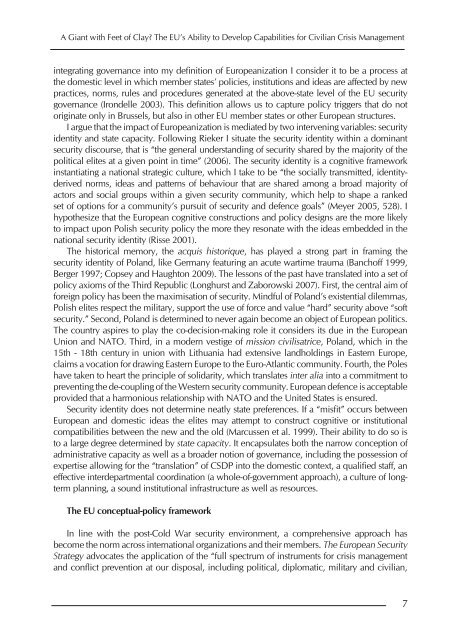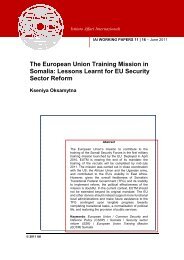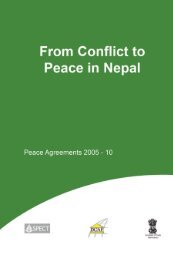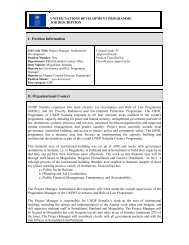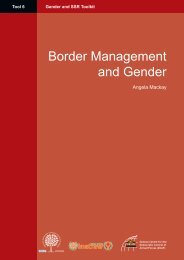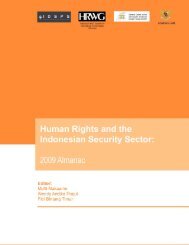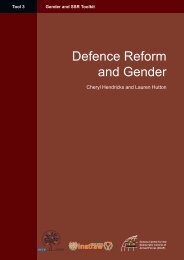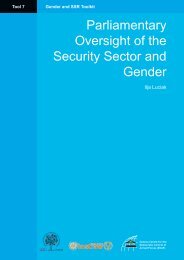The EU's Ability to Develop Capabilities for Civilian Crisis ... - ISSAT
The EU's Ability to Develop Capabilities for Civilian Crisis ... - ISSAT
The EU's Ability to Develop Capabilities for Civilian Crisis ... - ISSAT
Create successful ePaper yourself
Turn your PDF publications into a flip-book with our unique Google optimized e-Paper software.
A Giant with Feet of Clay? <strong>The</strong> EU’s <strong>Ability</strong> <strong>to</strong> <strong>Develop</strong> <strong>Capabilities</strong> <strong>for</strong> <strong>Civilian</strong> <strong>Crisis</strong> Managementintegrating governance in<strong>to</strong> my definition of Europeanization I consider it <strong>to</strong> be a process atthe domestic level in which member states’ policies, institutions and ideas are affected by newpractices, norms, rules and procedures generated at the above-state level of the EU securitygovernance (Irondelle 2003). This definition allows us <strong>to</strong> capture policy triggers that do no<strong>to</strong>riginate only in Brussels, but also in other EU member states or other European structures.I argue that the impact of Europeanization is mediated by two intervening variables: securityidentity and state capacity. Following Rieker I situate the security identity within a dominantsecurity discourse, that is “the general understanding of security shared by the majority of thepolitical elites at a given point in time” (2006). <strong>The</strong> security identity is a cognitive frameworkinstantiating a national strategic culture, which I take <strong>to</strong> be “the socially transmitted, identityderivednorms, ideas and patterns of behaviour that are shared among a broad majority ofac<strong>to</strong>rs and social groups within a given security community, which help <strong>to</strong> shape a rankedset of options <strong>for</strong> a community’s pursuit of security and defence goals” (Meyer 2005, 528). Ihypothesize that the European cognitive constructions and policy designs are the more likely<strong>to</strong> impact upon Polish security policy the more they resonate with the ideas embedded in thenational security identity (Risse 2001).<strong>The</strong> his<strong>to</strong>rical memory, the acquis his<strong>to</strong>rique, has played a strong part in framing thesecurity identity of Poland, like Germany featuring an acute wartime trauma (Banchoff 1999,Berger 1997; Copsey and Haugh<strong>to</strong>n 2009). <strong>The</strong> lessons of the past have translated in<strong>to</strong> a set ofpolicy axioms of the Third Republic (Longhurst and Zaborowski 2007). First, the central aim of<strong>for</strong>eign policy has been the maximisation of security. Mindful of Poland’s existential dilemmas,Polish elites respect the military, support the use of <strong>for</strong>ce and value “hard” security above “softsecurity.” Second, Poland is determined <strong>to</strong> never again become an object of European politics.<strong>The</strong> country aspires <strong>to</strong> play the co-decision-making role it considers its due in the EuropeanUnion and NATO. Third, in a modern vestige of mission civilisatrice, Poland, which in the15th - 18th century in union with Lithuania had extensive landholdings in Eastern Europe,claims a vocation <strong>for</strong> drawing Eastern Europe <strong>to</strong> the Euro-Atlantic community. Fourth, the Poleshave taken <strong>to</strong> heart the principle of solidarity, which translates inter alia in<strong>to</strong> a commitment <strong>to</strong>preventing the de-coupling of the Western security community. European defence is acceptableprovided that a harmonious relationship with NATO and the United States is ensured.Security identity does not determine neatly state preferences. If a “misfit” occurs betweenEuropean and domestic ideas the elites may attempt <strong>to</strong> construct cognitive or institutionalcompatibilities between the new and the old (Marcussen et al. 1999). <strong>The</strong>ir ability <strong>to</strong> do so is<strong>to</strong> a large degree determined by state capacity. It encapsulates both the narrow conception ofadministrative capacity as well as a broader notion of governance, including the possession ofexpertise allowing <strong>for</strong> the “translation” of CSDP in<strong>to</strong> the domestic context, a qualified staff, aneffective interdepartmental coordination (a whole-of-government approach), a culture of longtermplanning, a sound institutional infrastructure as well as resources.<strong>The</strong> EU conceptual-policy frameworkIn line with the post-Cold War security environment, a comprehensive approach hasbecome the norm across international organizations and their members. <strong>The</strong> European SecurityStrategy advocates the application of the “full spectrum of instruments <strong>for</strong> crisis managementand conflict prevention at our disposal, including political, diplomatic, military and civilian,7


